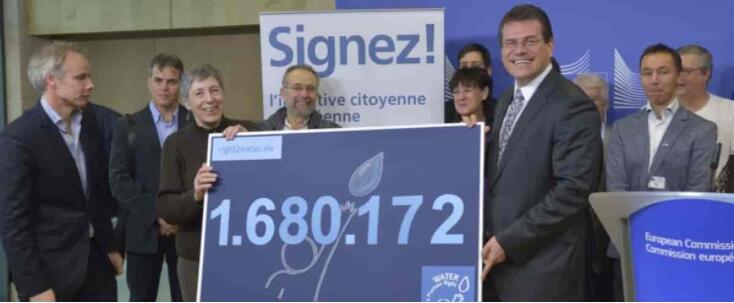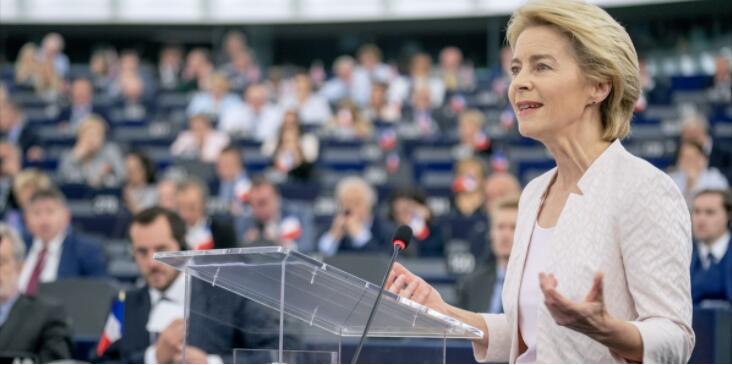When new legislation is initiated in the EU – which stands for European Union by abbreviationfinder, it is the European Commission that formulates and presents the bill. The Commission has a central legislative function, where it decides whether to propose new legislation, what the proposal should contain and the type of act.
The most common types of legislation are regulations and directives.
- As a general rule, regulations apply immediately in all Member States.
- Directives set common objectives, but Member States must implement the directive through national law before they can apply.
The vast majority of EU legislation is regulations.
The citizens’ initiative Right2Water led in 2018 to the European Commission revising the drinking water directive.
Although the Commission formally has a monopoly on legislative proposals, this does not mean that it is the only one to determine the development and future of the EU. EU Heads of State and Government meet at European Council summits and urgent meetings, defining the EU’s policy program and finding answers to common problems and challenges. The Commission must then deal with this, and if it requires legislative proposals, the European Commission must formulate them. In addition, the European Parliament and the EU Council of Ministers can call on the Commission to come up with new legislative proposals or proposals to amend existing legislation.
When a new European Commission has to be approved by the European Parliament, Parliament has, among other things, used the hearings of individual Commissioners to persuade them to take concrete initiatives.
Citizens’ Initiative
According to countryaah, the citizens of EU countries have also been given the opportunity to get the European Commission to present bills. In 2012, the so-called citizens’ initiative came into force, which enables citizens from at least 7 different member states and with at least 1 million signatures to request the European Commission to take a specific initiative. However, the Commission is not obliged to comply with the request, and in 2018, only four out of 66 citizens’ initiatives first had a bill from the Commission.
Hearings
When the European Commission prepares for new legislation, it will convene a public hearing. Citizens, companies, interest groups and industry organizations will have the opportunity to submit consultation responses. The consultation responses are part of the legislative preparatory work, and the Commission will typically refer to the consultation in their legislative proposals, but are not bound by the consultation responses no matter how many there are – or what they present.
An example of a consultation process is the preparations for an amendment to the EU regulation on the transport of waste. The changes are part of the European Green Deal, and the aim is to ensure that the EU’s waste transfer policy supports the transition to a circular economy and promotes waste recycling in the EU. At the same time, the Commission’s initiative aims to reduce waste exports. From March to April 2020, it was possible to submit a consultation response to an initial impact assessment from the European Commission within 4 weeks. A total of 81 consultation responses were submitted, in particular by business organizations and green interest groups from various EU countries. From Denmark, Danish Industry, the Danish Chamber of Commerce and the environmental organization Plastic Change submitted consultation responses. The Commission then had to return to the desk and write on its draft amendment to the regulation.
Lobbyists
In the legislative work, the responsible commissioners and their officials will also be directly approached by lobbyists. Lobbying is a very common part of the EU’s legislative work and the European Commission receives many inquiries, where those who are interested in a case ask for meetings and submit ideas and suggestions on how a bill should be drafted. Many Danish interest organizations, companies, regions and municipalities have established offices and seconded employees in Brussels, who try to influence the EU Commission and EU politicians. In addition, lobbying takes place at home in the Member States, where one tries to influence the responsible minister to work in a certain direction.
Legislative procedure
When the European Commission presents its bill, the political negotiations will begin. The EU system has different decision-making procedures, but the most important is called the ordinary legislative procedure. In this legislative procedure, the EU Council of Ministers and the European Parliament jointly take decisions.
The ordinary legislative procedure may include three rounds of negotiations between the Council of Ministers and the European Parliament. The European Commission is involved in the negotiations as an important mediator between Parliament and the Council. Parliament and the Council first consider the bill separately. Parliament sends the proposal to the appropriate committee for consideration and finds a rapporteur from one of the political groups for the proposal. The Members of the European Parliament, together with the rapporteur, shall consider the individual parts of the proposal in the relevant committees and propose amendments to the text. The European Commission’s proposals and any amendments are adopted by the European Parliament by a simple majority of the votes cast.
The Council of Ministers first considers the proposal in working groups, where officials review all the many parts of a proposal. The proposal and the European Parliament’s amendments are then sent for debate and voting between the ministers of the Member States. The Council of Ministers adopts proposals in the ordinary legislative procedure by a qualified majority. A qualified majority means that 55% of the countries and 65% of the EU population must vote in favor of a proposal.
Once the European Parliament and the Council of Ministers have made progress in their respective negotiations, they will begin to negotiate a compromise between the two institutions. Such compromise negotiations take place in so-called triologists. The European Commission is also sitting here with the Presidency of the Council of Ministers, rapporteurs and shadow rapporteurs from the European Parliament.
Although there are many countries, politicians and interests at stake when it comes to adopting an EU act, in fact, most often the European Parliament and the Council of Ministers managed to agree during the first reading. In the election period 2014-2019, 89% of the proposals were adopted first reading, against 85% in the election period 2009-2014, 72% in the election period 2004-2009 and 29% in the election period 1999-2004. On average, in the 2014-2019 parliamentary term, it took just under 18 months from the Commission’s submission of a proposal for its adoption in the first reading of the ordinary legislative procedure.
An example of a proposal adopted in first reading is the revision of the EU Waste Directive, which was originally adopted in 2008. In December 2015, the EU Commissioner for the Environment submitted a proposal to amend the directive, which, among other things, shall promote waste prevention, recycling and waste sorting. The new directive was adopted by the European Parliament and the Council of Ministers on 30 May 2018. In the European Parliament, 533 members voted in favor of the amended directive, 37 against, while 57 of the members present abstained. In the Council of Ministers, 26 member states voted in favor, which made up as much as 96.07% of the population. No countries voted against, but Hungary and Portugal abstained. As the act is a directive, Member States have until 5 July 2020 to implement it.
If the European Parliament and the Council of Ministers cannot agree on a bill at first reading, this will move on to second and third reading. Third reading takes place in a conciliation committee. It is important to note that this conciliation procedure has only been used a few times. In the election period 2014-2019, no proposals went to the conciliation committee and in the period 2009-2014, only nine proposals went to the conciliation committee. In most cases, this third phase is agreed upon. Since 1994, only four proposals that have proceeded to third reading have been rejected.


